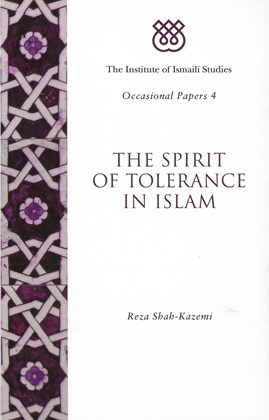The Spirit of Tolerance in Islam
I.B. Tauris in association with the Institute of Ismaili Studies
In 1932, the eminent British scholar of Islam, Sir Hamilton Gibb, wrote: ‘The nobility and broad tolerance of this religion [Islam], which accepted all the real religions of the world as God-inspired, will always be a glorious heritage for mankind. No other society has such a record of success in uniting, in an equality of status, of opportunity, and of endeavor, so many and so various races of humanity.’ (Whither Islam?) Such scholarly objectivity towards the tolerance which has historically characterized the Islamic tradition as a whole is in short supply these days. Through an insidious symbiosis of fanatical Muslims and prejudiced Islamophobes, the very opposite image of Islam has emerged as one of the most dangerous stereotypes of our times. The most cursory glance at history will not only reveal the falsity of this stereotype of an intolerant Islam, it will also reveal the little known fact that, not so long ago, it was the Islamic world that provided models of tolerant conduct for a fanatically intolerant Christian world tearing itself apart over dogmatic differences. The first part of this monograph examines the historical record of tolerance in the Islamic tradition, illustrating the expression of the principle of tolerance through the rule of such dynasties as the Ottomans, Mughals, Fatimids, and the Umayyads of Spain. In the second, the principle of tolerance is shown to be rooted in the spirit of the Qur’anic revelation and embodied in the exemplary conduct of the Prophet.
Acknowledgements
Introduction: The Trajectory of Tolerance
Part 1: A Glance at the Historical Record
The Ottomans
The Mughals
The Fatimids
The Umayyads of Cordoba
Dhimmīs: ‘Protected Minorities’
Part 2: The Spirit of Tolerance
Tolerance and Revealed Knowledge
Confirmation and Protection
Plurality of Faiths
Healthy Competition
Inevitability of Difference
The Prophetic Paradigm: Compassionate Forbearance
Epilogue
Notes
Select Bibliography
Dr Reza Shah-Kazemi is Managing Editor of Encyclopaedia Islamica and Research Associate at The Institute of Ismaili Studies, London. He is the author of several books in the fields of Islamic Studies and Comparative Religion. His publications include Justice and Remembrance: Introducing the Spirituality of Imam ‘Ali (London, 2006), Paths to Transcendence: According to Shankara, Ibn ‘Arabi and Meister Eckhart (Bloomington, 2006), The Other in the Light of the One: The Universality of the Qur'an and Interfaith Dialogue (Cambridge, 2006), and Spiritual Quest: Reflections on Qur‘anic Prayer according to the Teachings of Imam 'Ali (London and New York, 2011).

